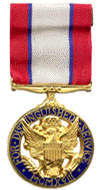| |
 |
The
Distinguished Service Medal
was authorized by Presidential Order dated January 2,
1918, and confirmed by Congress on July 9, 1918. It
was announced by War Department General Order No. 6,
January 12, 1918, with the following information
concerning the medal: "A bronze medal of appropriate
design and a ribbon to be worn in lieu thereof, to be
awarded by the President to any person who, while
serving in any capacity with the Army shall hereafter
distinguish himself or herself, or who, since April
6, 1917, has distinguished himself or herself by
exceptionally meritorious service to the Government
in a duty of great responsibility in time of war or
in connection with military operations against an
armed enemy of the United States." The Act of
Congress on July 9, 1918, recognized the need for
different types and degrees of heroism and
meritorious service and included such provisions for
award criteria. The current statutory authorization for the
Distinguished Service Medal is Title 10, United States Code,
Section 3743. |
Among the first awards of
the Distinguished Service Medal for service in World War I,
were those to the Commanding Officers of the Allied Armies:
Marshals Foch and Joffre, General Petain of France, Field
Marshal Haig of Great Britain, General Diaz of Italy, General
Gillain of Belgium, and General Pershing.
The Distinguished
Service Medal is awarded to any person who, while serving in
any capacity with the United States Army, has distinguished
himself or herself by exceptionally meritorious service to the
Government in a duty of great responsibility. The performance
must be such as to merit recognition for service which is
clearly exceptional. Exceptional performance of normal duty
will not alone justify an award of this decoration.
For service not related to actual
war, the term "duty of a great responsibility" applies to a
narrower range of positions, than in time of war, and requires
evidence of conspicuously significant achievement. However,
justification of the award may accrue by virtue of
exceptionally meritorious service in a succession of high
positions of great importance.
Awards may be made to
persons other than members of the Armed Forces of the United
States for wartime services only, and then only under
exceptional circumstances, with the express approval of the
President in each case. |
| |
|

